Articles
22.10.2025
Activités de formation et de conseil financées par le CELV : les offres en 2026
Le CELV offre à ses États membres une expertise européenne en matière d'éducation aux langues adaptée aux besoins concrets et aux contextes spécifiques de chaque pays. Dans une série de domaines clés, ce soutien bilatéral contribue à renforcer la coopération entre les États membres et le CELV en apportant l'expertise acquise dans le cadre des projets du CELV directement dans ces pays. Les expert·es du CELV travaillent avec les autorités nationales et les expert·es locaux·ales pour concevoir et mettre en œuvre des activités au niveau national, qui sont adaptées aux contextes particuliers et aux publics cibles. Il convient de noter que les activités proposées en coopération avec la Commission européenne font l'objet d'un appel à demandes distinct qui sera publié en décembre.

Les activités de formation et de conseil suivantes du CELV sont proposées pour 2026 :
- Les communautés de recherche-action pour les enseignant·es de langues
- Au-delà de l’EMILE – L’enseignement plurilittératie pour un apprentissage plus approfondi
- Le Volume complémentaire du CECR : la médiation et d’autres concepts fondamentaux – Focus : compétences des enseignant·es et des apprenant·es
- Le Volume complémentaire du CECR : la médiation et d’autres concepts fondamentaux – Focus : curricula et évaluation
- Promouvoir la citoyenneté numérique par l’éducation langagière
- Favoriser l’apprentissage de la langue 2 au travail pour les migrant·es adultes et les minorités ethniques
- Des environnements d’apprentissage optimisés pour et par les langues – Focus : langues de scolarisation
- Des environnements d’apprentissage optimisés pour et par les langues – Focus : apprentissage des langues dès le plus jeune âge
- La (les) langue(s) de scolarisation : une feuille de route pour les établissements scolaires
- Éducation plurilingue et interculturelle : compétences des apprenant·es et des enseignant·es
- La mise en œuvre de l’éducation plurilingue et interculturelle
- Les langues dès le plus jeune âge pour contribuer à l’éducation plurilingue et interculturelle
Les détails des activités proposées, les informations pratiques et le formulaire de demande sont disponibles ici : www.ecml.at/Trainingandconsultancy.
Les demandes d'activités de formation et de conseil doivent être soumises par l'intermédiaire du·de la représentant·e national·e du CELV au sein du Comité de direction. Les professionnel·les de l'éducation intéressé·es par une activité particulière sont invité·es à contacter leur représentant·e national·e.
La date limite de dépôt des demandes pour 2026 est fixée au 14 novembre 2025.
30.08.2022
Conférence de l'IDT « mit.sprache.teil.habe » (Vienne, Autriche, 15-20 août 2022) : les contributions du CELV
Du 15 au 20 août 2022, 2 800 participants venus de 110 pays se sont réunis à l’Université de Vienne pour la conférence intitulée « mit.sprache.teil.haben ». Les associations organisatrices ÖDaF (Association autrichienne pour l’allemand comme langue étrangère et seconde) et IDV (Association internationale des professeurs d’allemand), en étroite collaboration avec l’Institut Goethe, ont proposé un programme très complet pour susciter la réflexion sur les questions tant théoriques que pratiques liées à l’enseignement et à l’apprentissage de l’allemand.
Dans son discours d’ouverture de la conférence, la Directrice exécutive du CELV Sarah Breslin a fait écho à la devise de la conférence portant sur le rôle des langues pour une participation active dans la société – mit.sprache.teil.haben – en mettant en avant le rôle vital du plurilinguisme et des compétences interculturelles pour une culture démocratique en Europe.
Les initiatives et les ressources que propose le CELV aux enseignants et aux autres professionnels des langues étaient présentées au stand d’information du CELV, qui a enregistré une forte affluence. Le jour de l’ouverture, deux membres du Comité de direction du CELV y ont été accueillis : Claudia Petiti représentant la Suisse et Steinar Nybøle représentant la Norvège.
Deux activités du CELV ont été proposées dans le cadre du programme de la conférence : la présentation du projet du CELV : « CLIL in German: Transitions between educational levels » par Petra Daryai-Hansen, Beate Lindemann et Aina Būdvytytė (voir le rapport de l’équipe ci-dessous) et un atelier portant sur la ressource du projet du CELV « La/les langue(s) de scolarisation : une feuille de route pour les établissements scolaires ». Les commentaires des participants ont mis en évidence la valeur pratique et le caractère novateur des approches présentées par le CELV pour une éducation aux langues innovante.
Le CELV était également représenté lors de la présentation d’un livre organisée par la Chambre du travail de Vienne. La nouvelle publication Fokus Mehrsprachigkeit. 14 Thesen zu Sprache und Sprachenpolitik. Beiträge aus Österreich und Europa (Objectif Multilingualisme. 14 thèses portant sur les langues et les politiques linguistiques. Contributions émanant de l’Autriche et d’autres pays européens) met en avant à quel point le multilinguisme peut contribuer à la cohésion de la société. Elle comprend un article rédigé par Susanna Slivensky (CELV) intitulé « Mobilität und Sprachenlernen für Demokratie in Europa. Perspektiven des Europäischen Fremdsprachenzentrums des Europarates » (Mobilité et apprentissage des langues pour la démocratie en Europe. Perspectives du Centre européen pour les langues vivantes du Conseil de l’Europe). L’article est assorti d’une contribution présentant le point de vue de la Commission européenne/Kristina Cunningham et Claudia Kropf : « Vom Binnenmarkt zum Europäischen Bildungsraum: Mehrsprachigkeit und Mobilität als Motor für Integration, Wachstum und Beschäftigung in der Europäischen Union » (Du marché unique à l’espace européen de l’éducation : Le multilinguisme et la mobilité comme moteur de l’intégration, de la croissance et de l’emploi dans l’Union européenne).
D’autres priorités prometteuses en matière de politiques linguistiques ont été définies lors de la séance de clôture de la conférence : Hans-Jürgen Krumm a prononcé un discours en séance plénière sur le thème du concept de « Sprachengerechtigkeit » (justice linguistique) et les « Wiener Thesen zur Sprachenpolitik – 11+1 Forderungen zur Stärkung gesellschaftlicher Teilhabe” (Thèses réalisées à Vienne portant sur la politique linguistique – 11+1 Revendications pour le renforcement de la participation sociale).
Avec en toile de fond la nouvelle Recommandation du Comité des Ministres du Conseil de l’Europe sur l’importance de l’éducation plurilingue et interculturelle, ces synergies sont particulièrement opportunes pour renforcer l’innovation dans l’éducation aux langues.
« EMILE dans des langues autres que l'anglais – Transitions réussies entre les étapes éducatives » : rapport de l'équipe du CELV
Le projet du CELV « EMILE dans des langues autres que l'anglais – Transitions réussies entre les différents niveaux d'enseignement » a été présenté à la conférence de l’IDT à Vienne le jeudi 18 août 2022. Tout d'abord, les principaux résultats d'une enquête exhaustive par questionnaire, à laquelle ont répondu 38 experts de 29 pays, ont été présentés. Ces résultats montrent que l'EMILE n'est présent que dans une mesure très limitée dans les langues autres que l'anglais dans les pays européens. En outre, l'EMILE n'est presque jamais lié à l'éducation plurilingue, et les transitions entre les niveaux d'enseignement sont très peu prises en compte. Ensuite, certains résultats clés de deux des huit groupes de travail du projet ont été exposés. D'une part, un exemple du groupe de travail sur les curriculums a porté sur le curriculum lituanien révisé pour l’allemand langue étrangère, qui prend en compte les transitions entre les niveaux d'enseignement dans l’EMILE en allemand. D'autre part, certains points principaux du groupe de travail sur la formation des enseignants soulignent qu'il est nécessaire de développer davantage les initiatives soutenant l’EMILE en allemand dans la formation des enseignants, que l'EMILE dans l’enseignement des langues autres que l’anglais devrait être intégré dans la formation des enseignants pour toutes les matières scolaires, et qu'il est nécessaire d’assurer une collaboration intensive entre les enseignants et les étudiants se formant au métier de l’enseignement pour les matières non linguistiques et linguistiques à différents niveaux éducatifs.

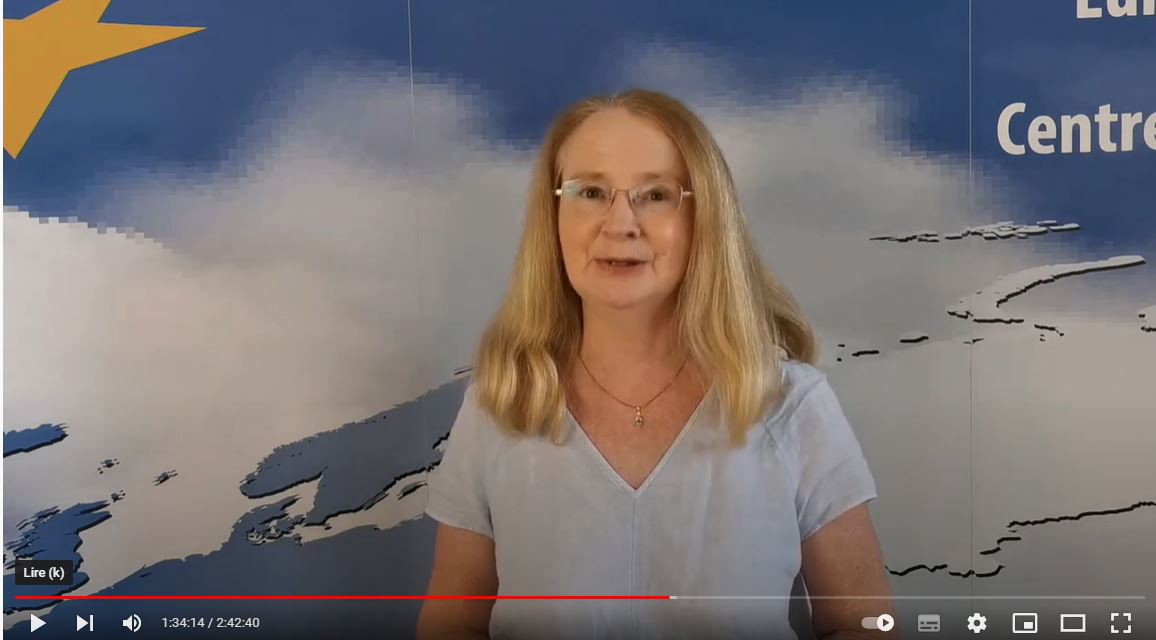
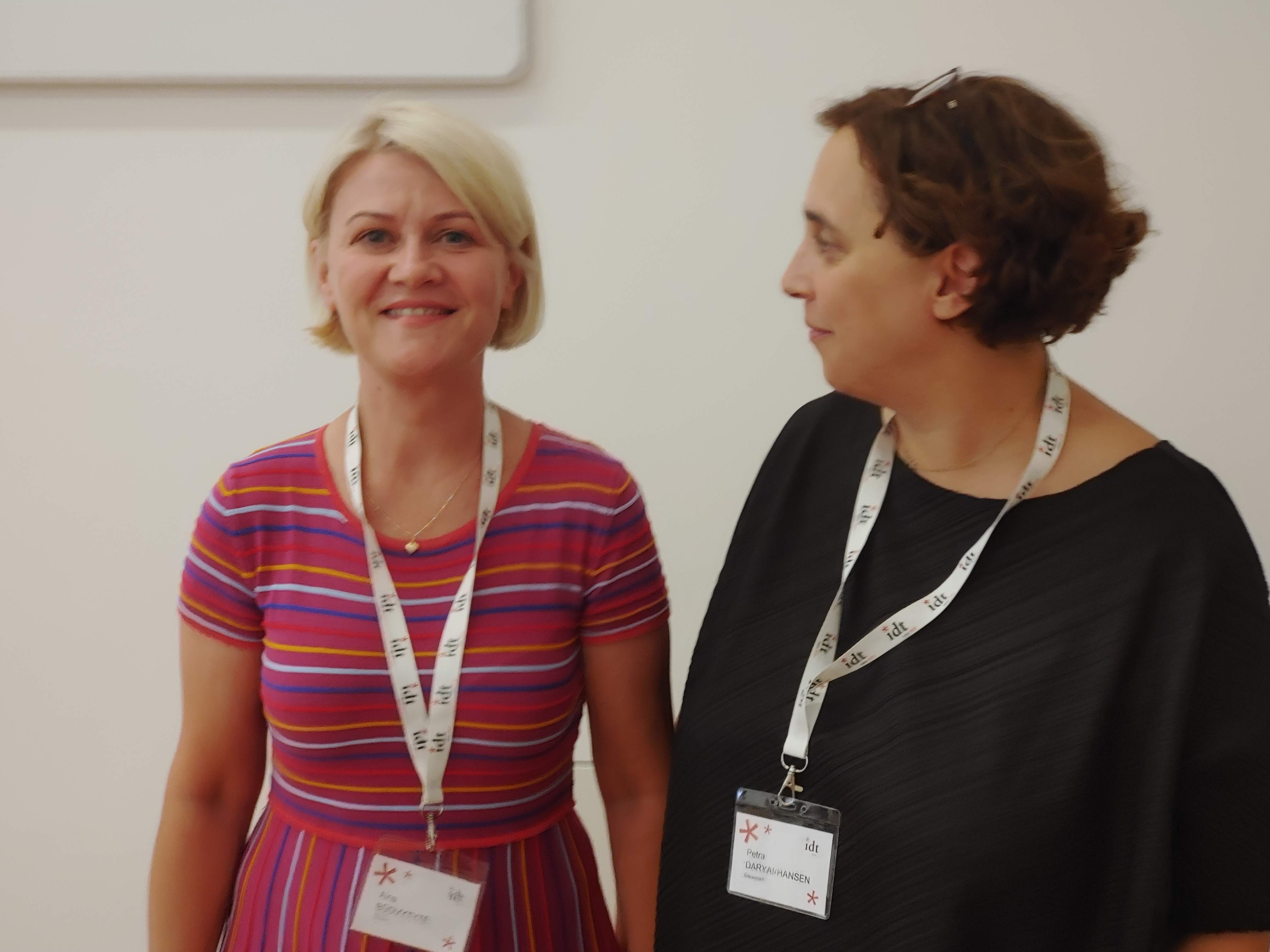
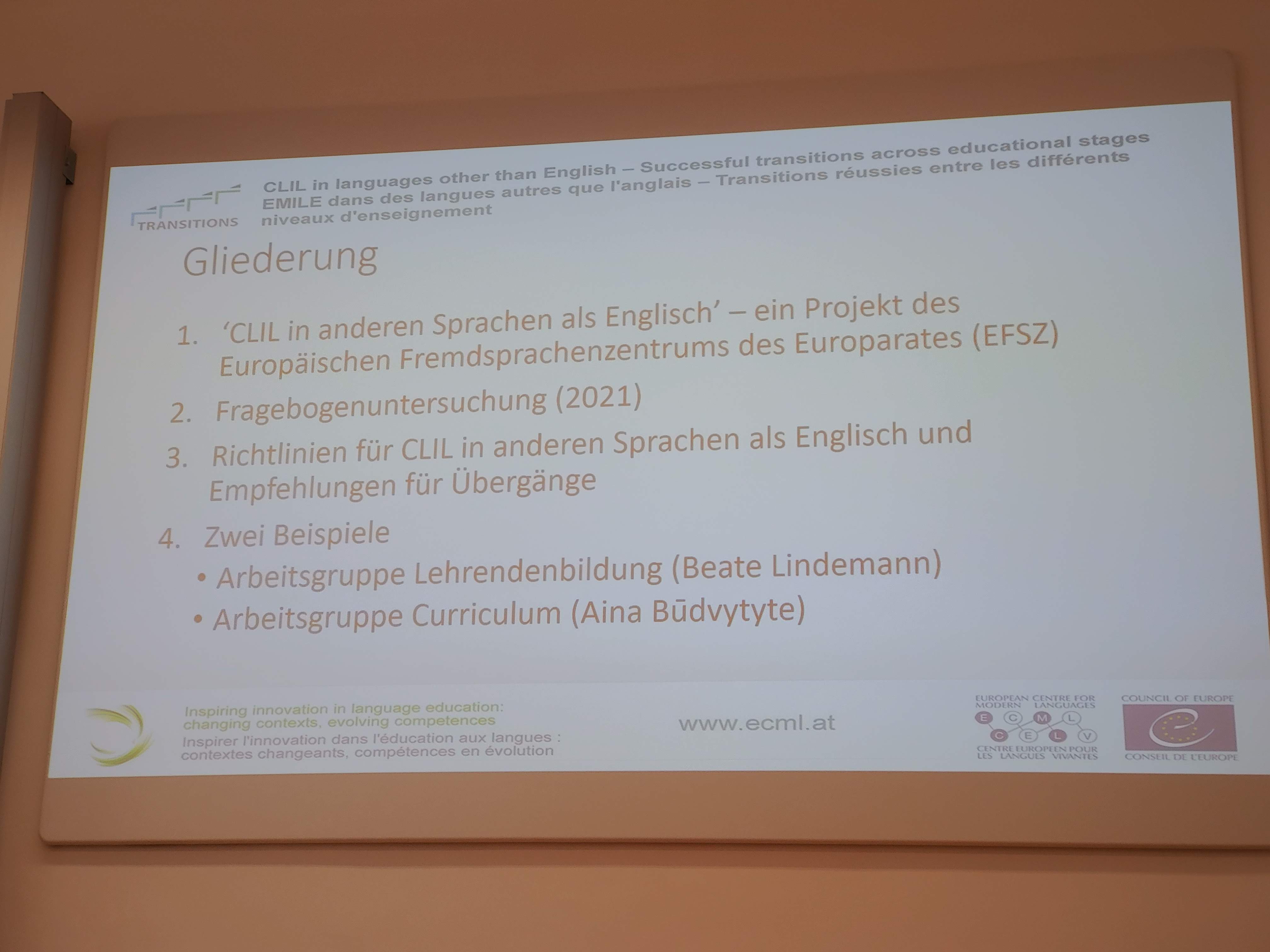
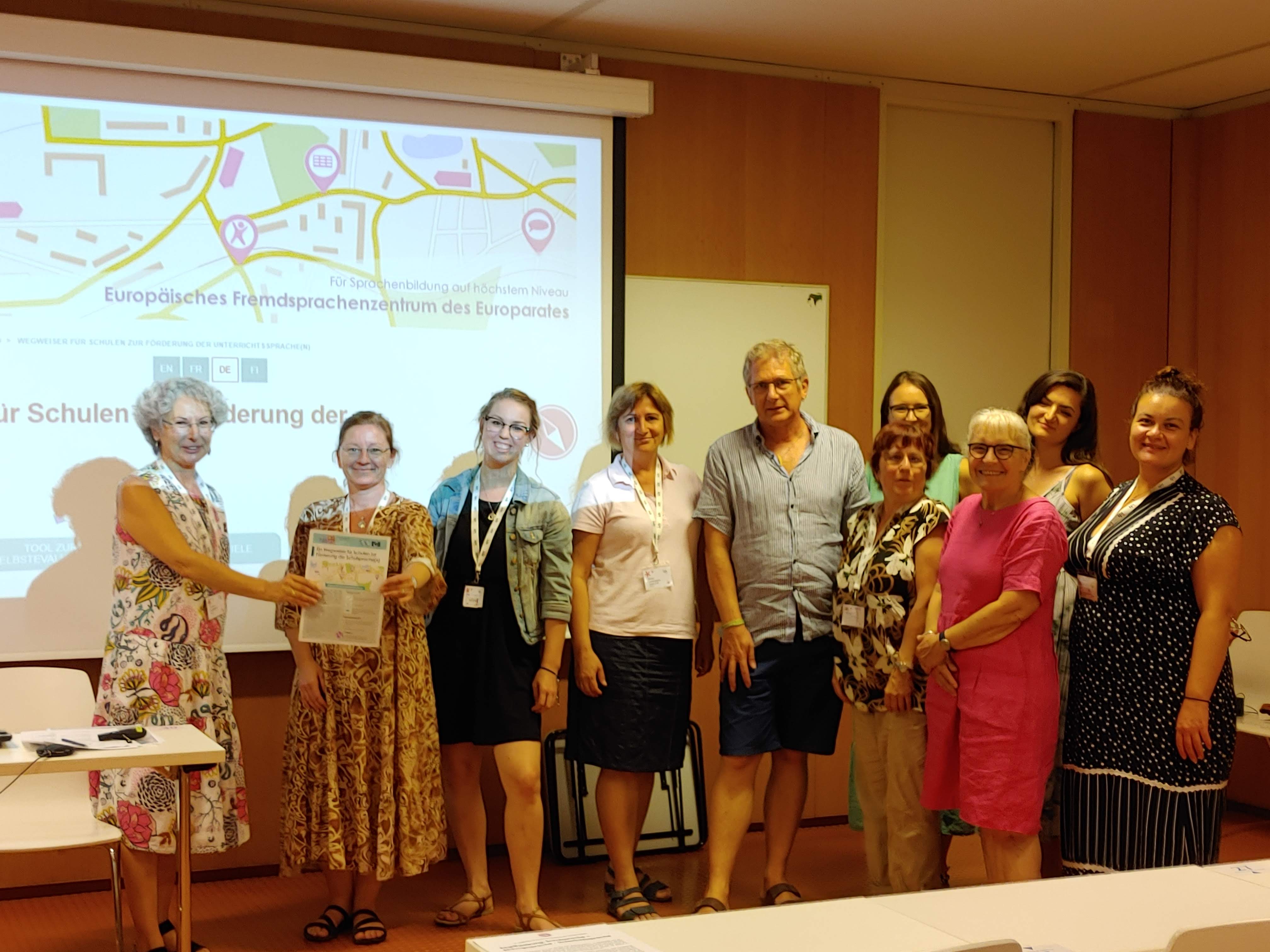
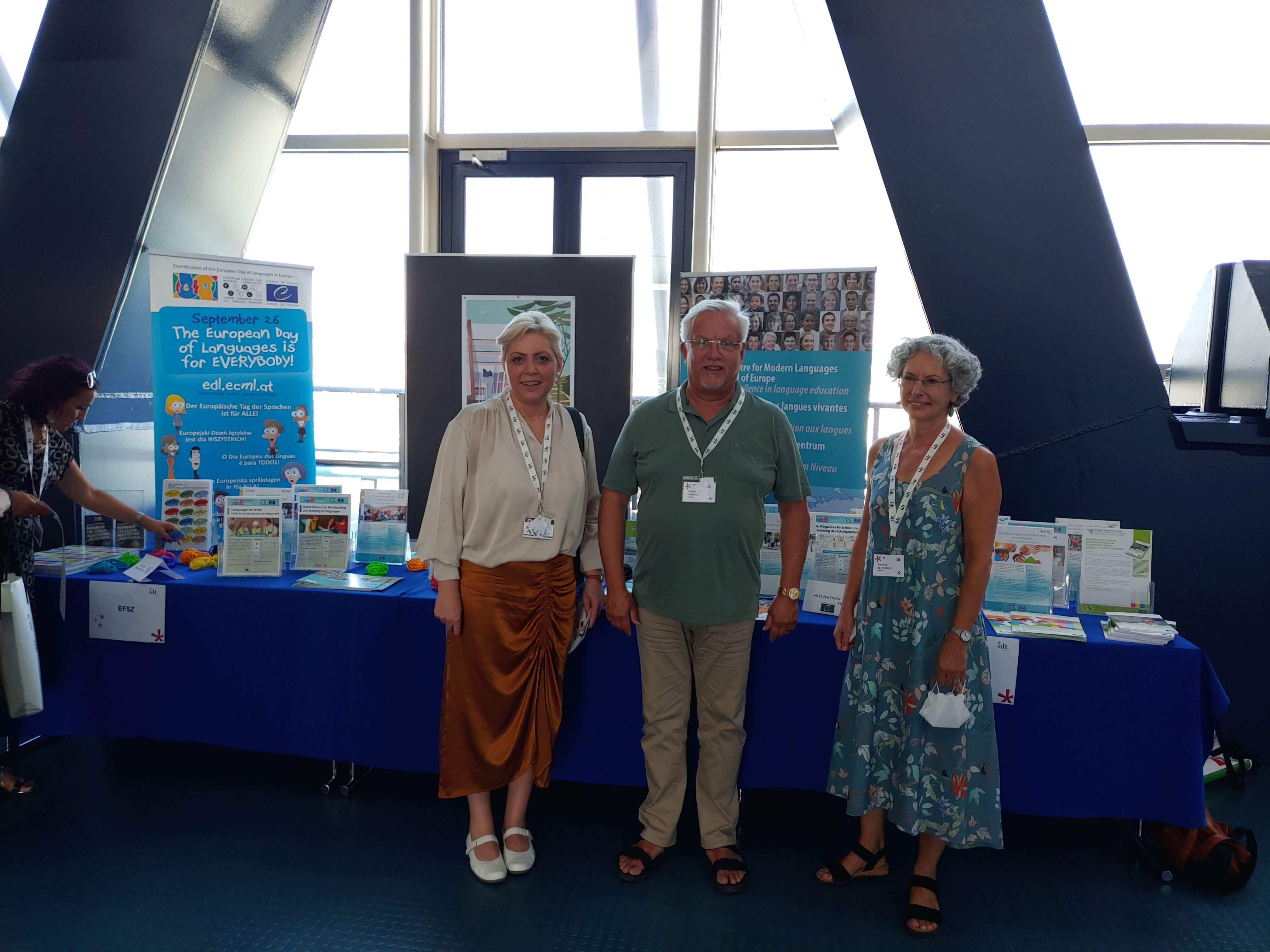
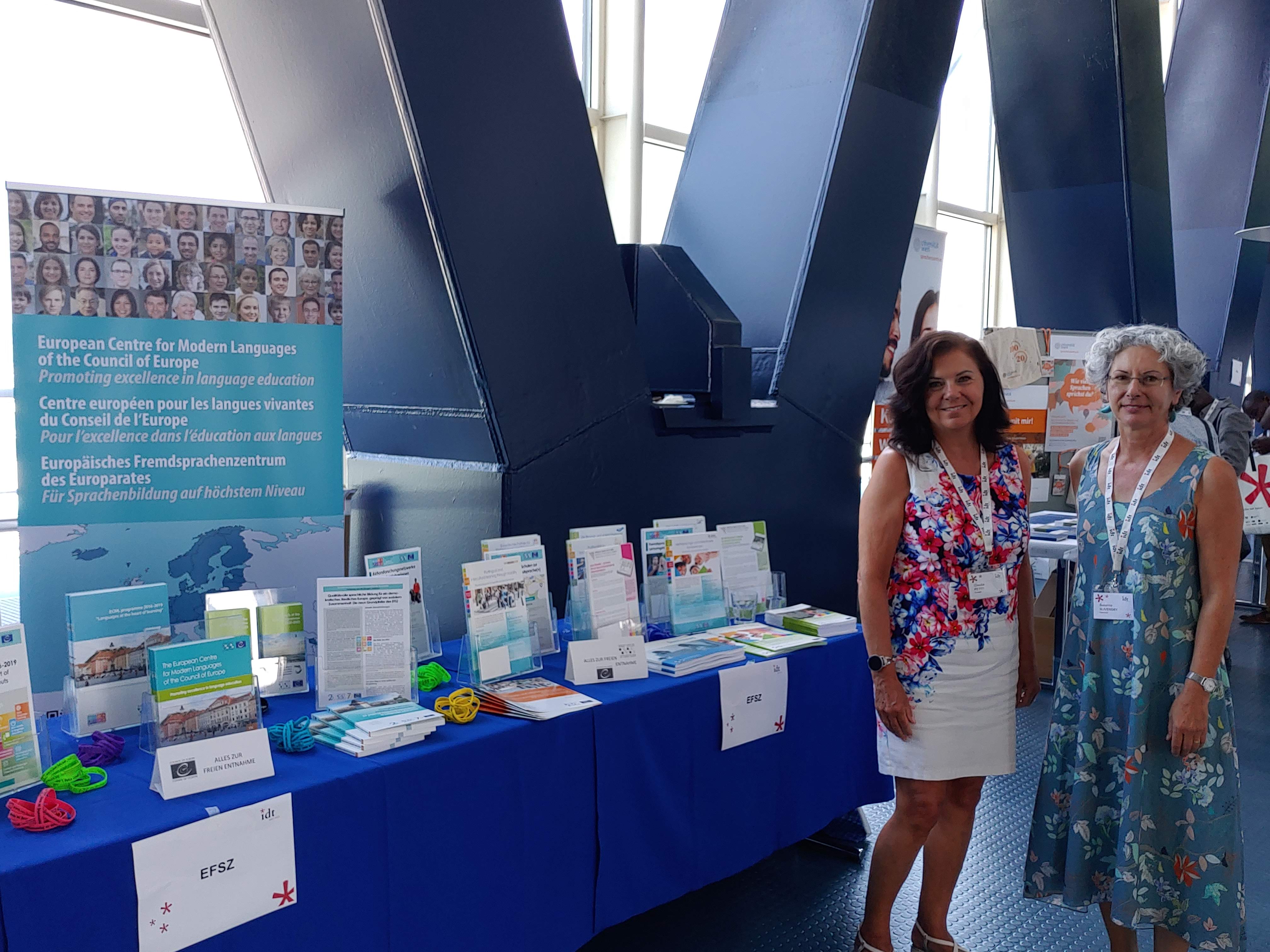
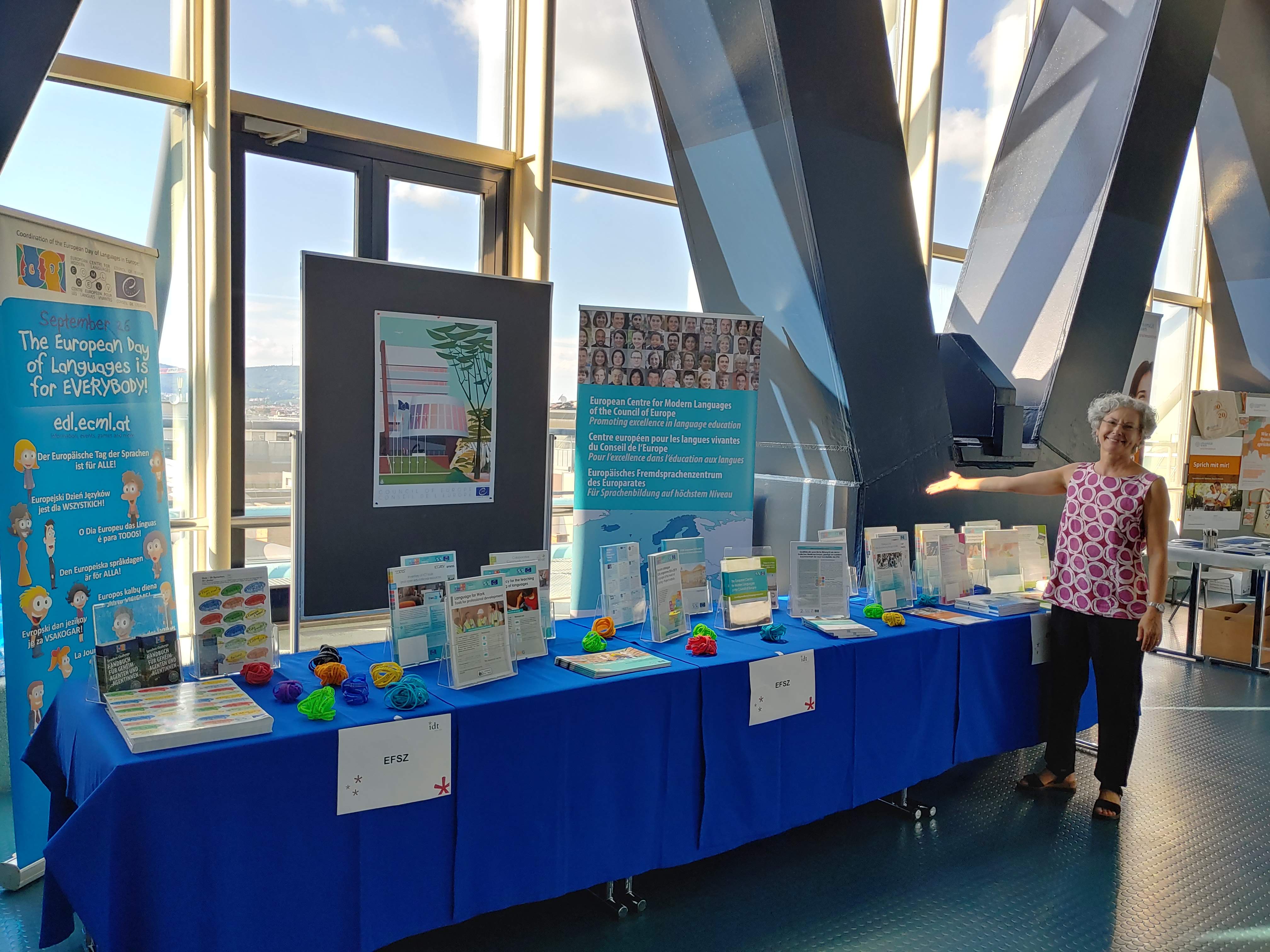
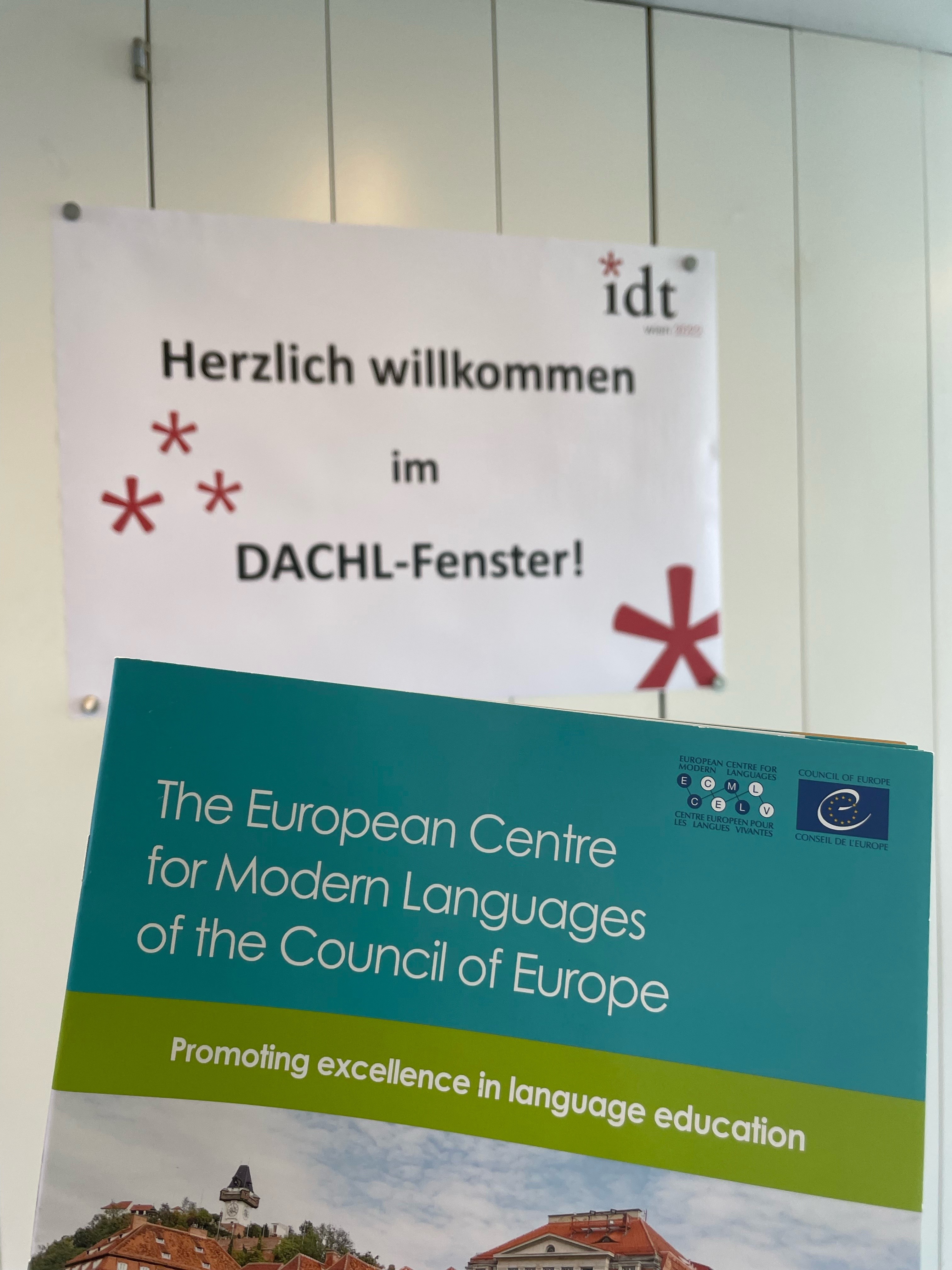

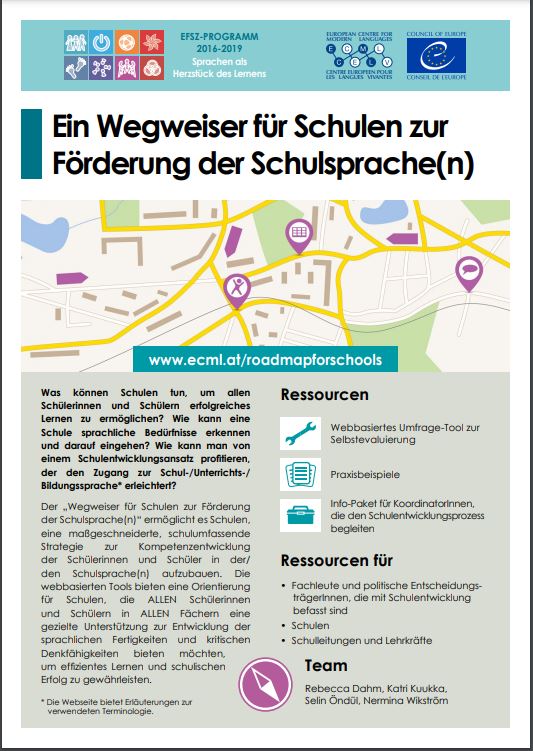
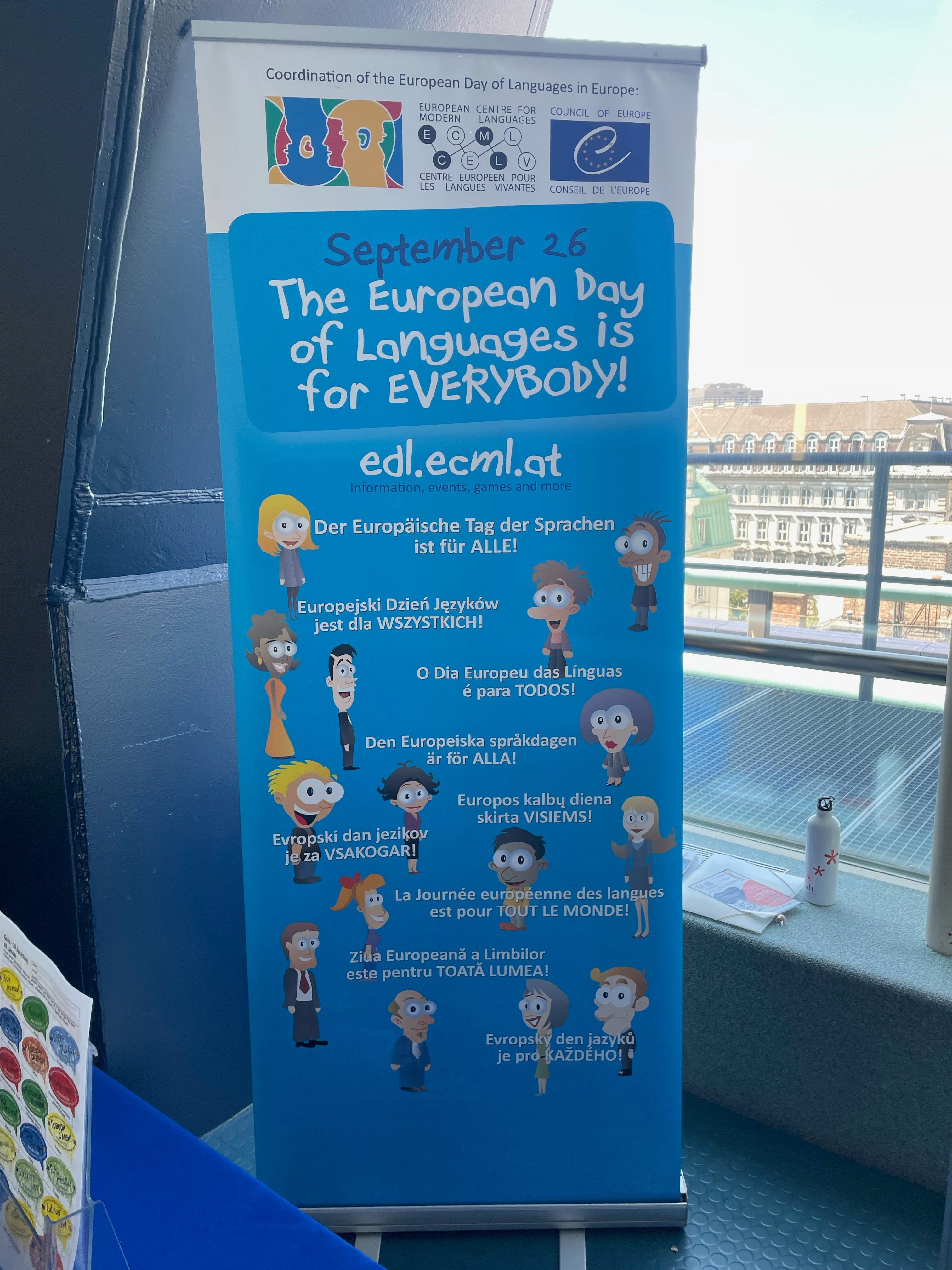
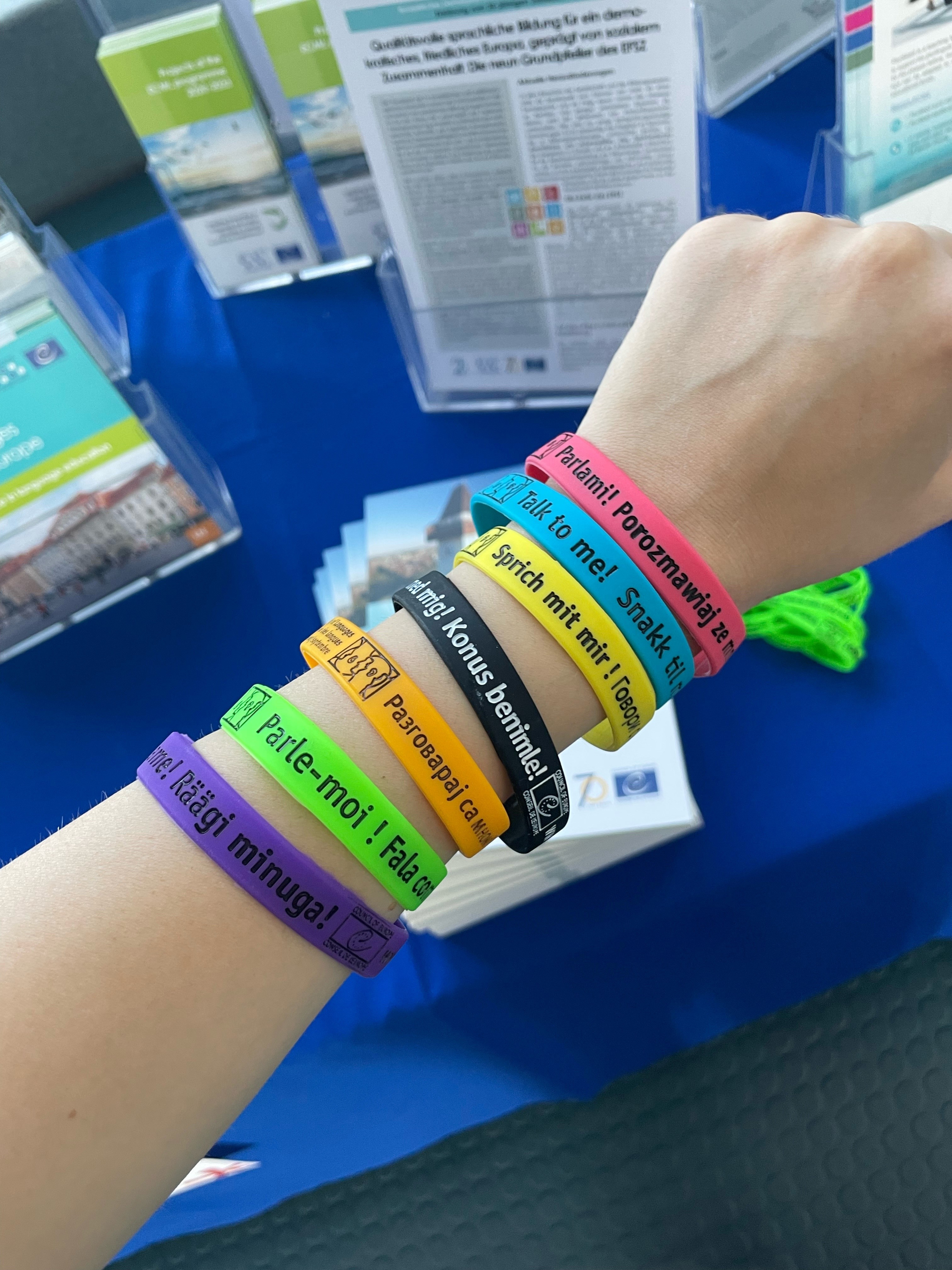
10.03.2022
Adaptation de ressources du CELV en Irlande : nouvelle boîte à outils pour un regard interculturel sur nos écoles
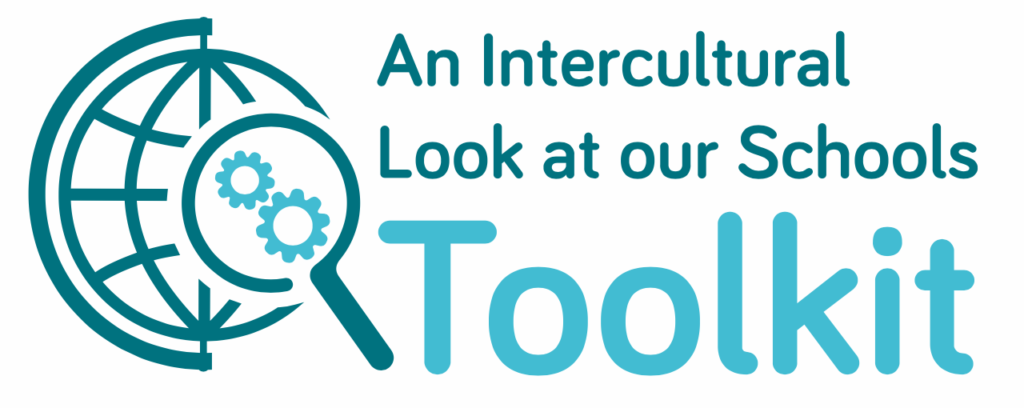
La boîte à outils en ligne An Intercultural Look at our Schools Toolkit a été conçue pour l’auto-évaluation et le soutien de la diversité interculturelle et linguistique dans les écoles qui souhaitent aborder l’inclusion. Elle a été développée en Irlande comme une version localisée des outils d’auto-évaluation créés dans le cadre du projet du CELV « La/les langue(s) de scolarisation :
une feuille de route pour les établissements scolaires » (disponible en français, anglais, allemand et finnois).
Mis en place à l’initiative du Post-Primary Languages Ireland (PPLI) en collaboration avec le Dublin-Dun Laoghaire Education and Training Board (DDLETB), cette boîte à outils a pour but de :
- sensibiliser au rôle que jouent les identités et les compétences plurilingues et pluriculturelles des élèves dans leurs apprentissages en milieu scolaire ;
- aider les enseignants et la direction des écoles à faciliter et à promouvoir l’accès des élèves au programme scolaire ;
- encourager les écoles à jeter un regard interculturel sur les aspects de la vie scolaire au-delà de la salle de classe, afin de s’assurer que toutes les langues et cultures de la communauté scolaire sont incluses et valorisées.
Cette ressource préconise une approche globale de l’école dans ses efforts d’amélioration. Elle fait entendre et inclut les voix de tous les membres de la communauté scolaire.
Pour en savoir plus, consultez le site https://ilaos.ppli.ie/.
Regarder la vidéo.
21.10.2021
Webinaire « La/les langue(s) de scolarisation : une feuille de route pour les établissements scolaires »
Webinaire « La/les langue(s) de scolarisation : une feuille de route pour les établissements scolaires »
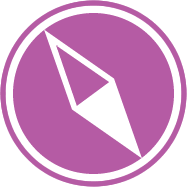
Nous savons que la langue est au cœur de tout apprentissage ; nous savons que des compétences hautement développées dans la langue de scolarisation sont essentielles à la réussite des apprenants. Mais comprenons-nous l'importance d'adopter une approche à l’échelle de l’établissement scolaire pour identifier et répondre aux besoins linguistiques des apprenants ?
Si vous souhaitez découvrir les avantages d'une telle approche en matière de langue de scolarisation, ainsi que des conseils sur la manière d'impliquer toutes les parties prenantes de votre communauté scolaire, ce webinaire est fait pour vous.
Veuillez noter que le CELV organise des ateliers dans les États membres sur l'utilisation de la Feuille de route dans le cadre de son offre de formation et de conseil. Pour toute demande concernant le 2022, veuillez contacter votre représentant national.
La Feuille de route est une ressource en ligne conviviale qui facilite la création d’un plan de développement stratégique pour l'ensemble de l'établissement scolaire qui favorise l'inclusion en rendant visibles toutes les langues présentes dans la communauté scolaire. En outre, elle fournit des conseils concrets sur la manière de faire progresser les compétences des apprenants dans la ou les langues de scolarisation.
Elle propose un outil d'auto-évaluation interactif, des supports concrets et une vaste base de données de pratiques prometteuses ; tout élément peut être adapté à des contextes nationaux spécifiques. Une telle adaptation a déjà eu lieu en Irlande. Le pourquoi et le comment de cette adaptation seront présentés lors du webinaire.
Le webinaire est destiné à tous ceux qui travaillent dans le domaine de l'éducation aux langues et sur des thèmes liés aux langues dans le cadre du développement scolaire - enseignants, formateurs d'enseignants, chefs d'établissement et administrateurs
Webinaire en anglais: https://www.youtube.com/watch?v=FGqMab9rdMM
Enregistré le 21 octobre 2021
26.04.2021
« La/les langue(s) de scolarisation : une feuille de route pour les établissements scolaires » : un nouveau site web pour le développement d’environnements scolaires sensibilisés aux langues

Le Centre européen pour les langues vivantes (CELV) du Conseil de l’Europe a le plaisir de vous annoncer que son nouveau site web de ressources « La/les langue(s) de scolarisation : une feuille de route pour les établissements scolaires » (www.ecml.at/roadmapforschools) est prêt à l’emploi en français, en anglais et en allemand. Ce produit résulte du programme du CELV « Les langues au cœur des apprentissages » (2016-2019).
Ce site web permet aux établissements scolaires et aux écoles de se concentrer sur l’amélioration systématique de la qualité en mettant en place une stratégie scolaire globale, sur mesure, visant à améliorer les compétences des apprenants dans la ou les langues de scolarisation.
La crise de la Covid-19 a mis en évidence la vulnérabilité des apprenants qui ont du mal à maîtriser la langue de scolarisation et le langage académique spécifique aux différentes matières. Ces ressources pratiques aideront les écoles et les établissements scolaires à construire des environnements d’apprentissage plus inclusifs, plus favorables et plus sensibles aux langues, qui sont essentiels à une éducation de qualité et à la réussite scolaire.
La FEUILLE DE ROUTE propose trois éléments pour aider les établissements scolaires à mettre en place leur plan stratégique personnalisé :
- L’outil d’auto-évaluation permet aux différents acteurs (personnel de direction, enseignant(e)s, personnel non enseignant, élèves et parents) de positionner leur établissement en fonction d’un certain nombre d’énoncés. Il comprend également un rapport informatisé afin de pouvoir facilement diffuser les résultats et initier les discussions.
- Une base de données recensant des pratiques prometteuses de différents pays fournit des pistes à l’établissement scolaire/l’école souhaitant travailler spécifiquement sur l’un des domaines à développer.
- Une mallette pour les coordinateurs contient un ensemble de documents qui aident l’établissement scolaire/l’école à mettre en œuvre la FEUILLE DE ROUTE (entre autres, un guide pas-à-pas, lettre aux parents, présentation PowerPoint destinée aux acteurs, etc.).
25.10.2019
« La/les langue(s) de scolarisation : une feuille de route pour les établissements scolaires » : un outil utile bientôt disponible en ligne !
La réunion d'experts des 2 et 3 octobre 2019 a permis à l'équipe de procéder à une validation finale complète de l'outil d'auto-évaluation, des différentes pratiques prometteuses, des documents-clés ainsi que du site Web. Elle nous a permis d'avoir une vision complète de la manière dont le projet "FEUILLE DE ROUTE" s’est transformé en outil concret et utile permettant aux acteurs des établissements scolaires de mettre en place une approche globale grâce à l’auto-évaluation, la base de données des pratiques prometteuses ainsi que la mallette pour les coordinateurs facilitant la mise en œuvre du projet, de A à Z.
Les dialogues et la collaboration au sein de l'équipe ont été extrêmement fructueux, et nous nous félicitons d'avoir pu tout vérifier avec l'aide des représentants du CELV. Nous avons réussi à passer en revue tous les éléments cruciaux de notre ordre du jour, nous nous sommes mis d'accord sur les dernières tâches à accomplir avant le lancement du site Web et nous avons même trouvé le temps de célébrer le succès de la dernière réunion d'experts du projet “langue de scolarisation” !
L’équipe de projet : Rebecca Dahm (France, coordinatrice), Katri Kuukka (Finlande),
Selin Öndül Talegon (Suisse), Nermina Wikström (Suède)
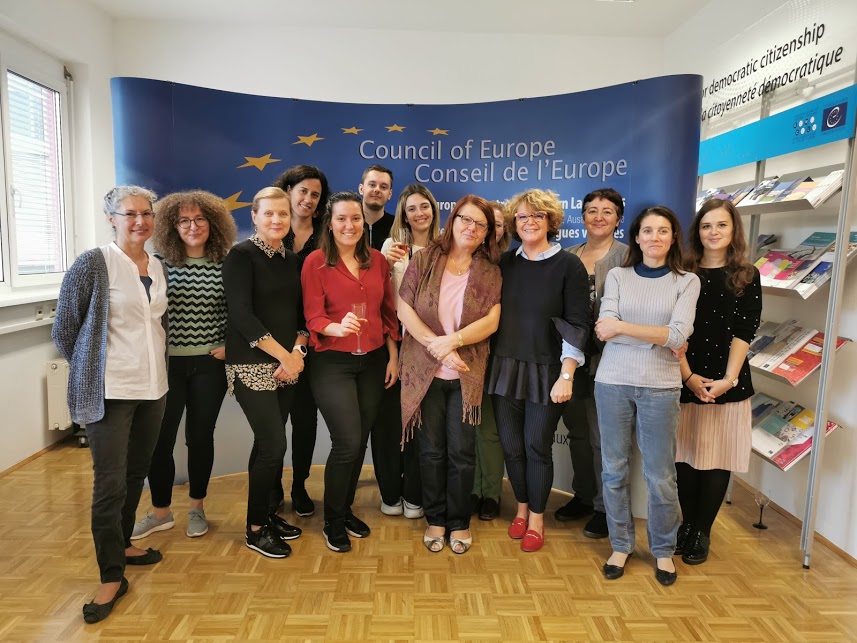
22.05.2019
La/les langue(s) de scolarisation : une feuille de route pour les établissements scolaires – on y est presque !
Authors: Rebecca Dahm (France, coordinatrice du projet), Katri Kuukka (Finlande), Selin Öndül Talegon (Suisse), Nermina Wikström (Suède)
Le projet « La/les langue(s) de scolarisation : une feuille de route pour les établissements scolaires » est soutenu par le Centre européen pour les langues vivantes (CELV, Conseil de l’Europe) et développé par une équipe de quatre experts. La Feuille de route s’adresse aux établissements primaires et secondaires qui souhaitent aider tous leurs élèves à mieux réussir. Cependant, l’accent est principalement mis sur les élèves qui dépendent de l’école pour développer la langue de scolarisation, c’est-à-dire la langue habituellement utilisée pour enseigner les différentes matières scolaires. L’absence ou l’accès limité à cette langue dans un contexte familial, pour quelque raison que ce soit (contexte socio-économique, enfants nouvellement arrivés, contexte familial de langue des signes, etc.) ne permet pas à ces élèves d’accéder à la connaissance de la même manière que les autres.
Au cours de l’année 2018, l’équipe du projet, en collaboration avec un grand nombre d’experts, a mis en place un outil d’auto-évaluation en ligne qui constitue la première étape de la Feuille de route. L’année 2019 verra la finalisation de la Feuille de route avec la mise en place d’une base de données des pratiques prometteuses, issues des projets du CELV et des pratiques des enseignants de différents pays européens. Les établissements utilisant la Feuille de route recevront ainsi un retour complet sur leurs points forts et les leviers de progrès, incluant des exemples de pratiques prometteuses afin de les guider davantage dans leur démarche vertueuse.
N.B. : Nous utilisons le terme d’« établissements scolaires » afin d’inclure à la fois les écoles primaires, les collèges et lycées dans notre réflexion.
Définitions essentielles
Les concepts-clés liés à la Feuille de route sont les suivants : langues/s de scolarisation, dimension linguistique, langue académique et élèves vulnérables.
Comme le pose le Conseil de l’Europe, « Par ‘langue de scolarisation’, on entend la langue utilisée pour l’enseignement des différentes matières et pour le fonctionnement des établissements scolaires. Le plus souvent il s’agira de la ou des langues officielles de l’État ou de la région, par exemple le polonais en Pologne ou l’italien en Italie, mais il peut s’agir aussi de langues régionales ou minoritaires reconnues officiellement, de langues étrangères ou de la migration. Selon les contextes nationaux ou régionaux, plusieurs langues de scolarisation sont utilisées », (Rec(2014)5, Comité des Ministres, Conseil de l’Europe, 2014). Beacco et al. (2016) soulignent également la nécessité pour TOUS les enseignants d’être conscients de la dimension linguistique de leur(s) matière(s). En effet, l’objectif de toute matière est d’aider les élèves à acquérir des connaissances, mais cela ne peut se faire sans les aider à en saisir le sens.
Le langage utilisé dans l’enseignement des matières scolaires est donc un instrument qui sert à la fois à conceptualiser le contenu et à s’exprimer dans un style rationnel et « académique » selon les conventions et registres spécifiques à chaque matière (Vollmer, 2006). Le concept de langue académique est utilisé pour désigner le type de langage nécessaire pour participer, comprendre et communiquer avec succès dans des activités cognitives exigeantes, adaptées à l’âge et au contexte (Himmele & Himmele, 2009).
Enfin, le concept d’élèves vulnérables est également au cœur de notre Feuille de route : comme le précise Fleming (2009), il renvoie à tous les élèves qui dépendent de l’école pour comprendre et apprendre le large éventail de codes culturels intégrés dans l’utilisation formelle de la langue.
Une feuille de route numérique pour les établissements scolaires
Nous nous sommes appuyés sur ces concepts pour mettre en place une « feuille de route », outil d’enquête numérique qui accompagne les établissements scolaires dans leur réflexion et dans la mise en œuvre d’un plan stratégique qu’ils ont eux-mêmes déterminé. Pour ce faire, tous les acteurs de l’établissement, c’est-à-dire le personnel de direction, les enseignants, le personnel non enseignant, les élèves et les parents, sont invités à compléter sur une base individuelle un outil d’auto-évaluation adapté à chaque acteur.
Lorsqu’il se connecte, chaque acteur peut déterminer son rôle, ce qui le conduira à une enquête spécifique, adaptée à son profil. La page d’accueil de l’enquête se présente comme suit :
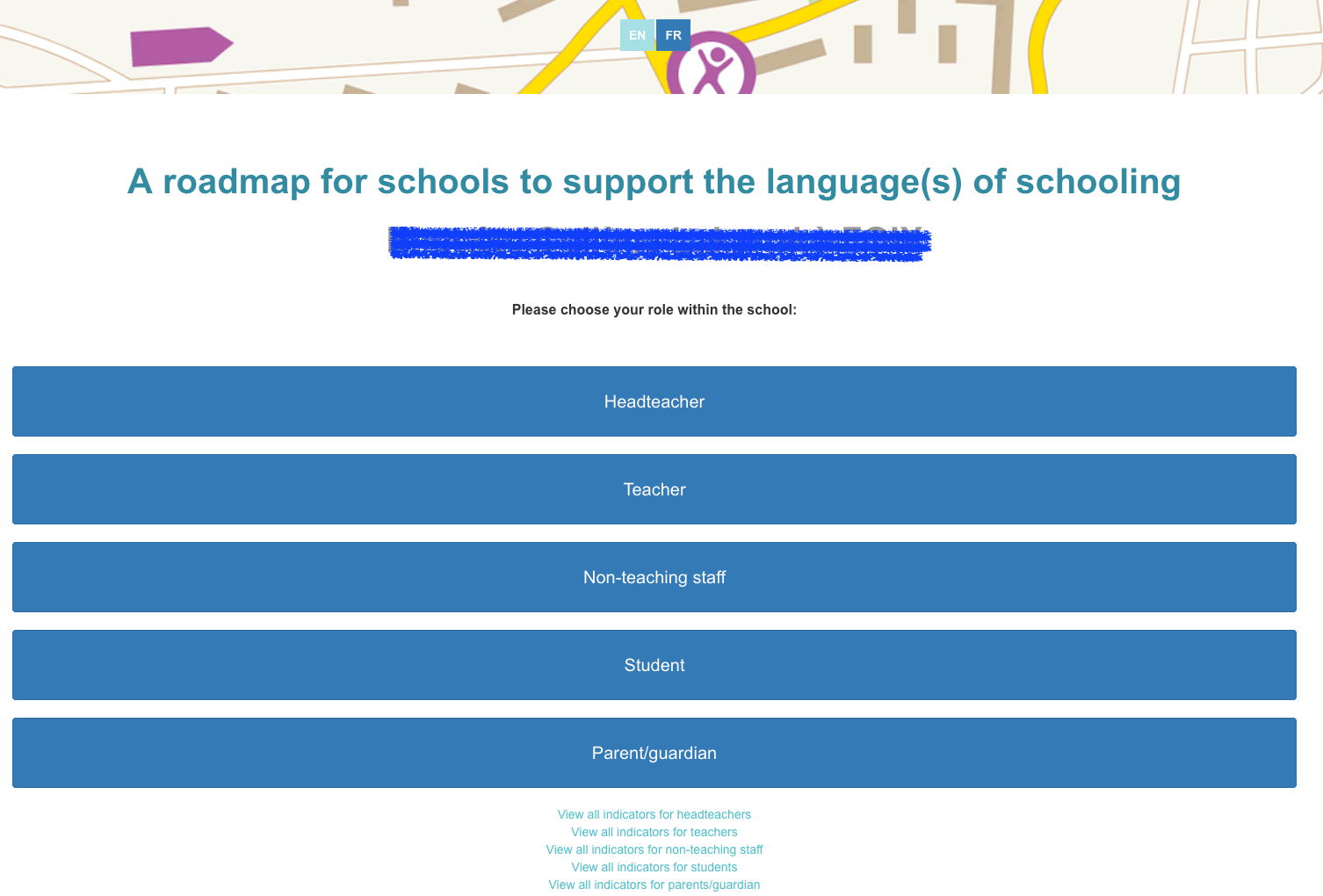
Capture d’écran 1 : Entrée dans l’enquête pour chacune des acteurs
Chaque acteur est amené à réfléchir à neuf domaines thématiques divisés en un certain nombre de déclarations. Ces domaines invitent les répondants à évaluer la façon dont l’établissement prend en compte la dimension linguistique des matières, connaît et utilise les ressources disponibles et accueille les élèves et les familles dans leur diversité. Pour chaque phrase, l’acteur choisit de positionner l’établissement sur une échelle de 1 à 4 (ou de rouge à vert, avec la possibilité de neutraliser la question), comme on peut le voir ci-dessous.
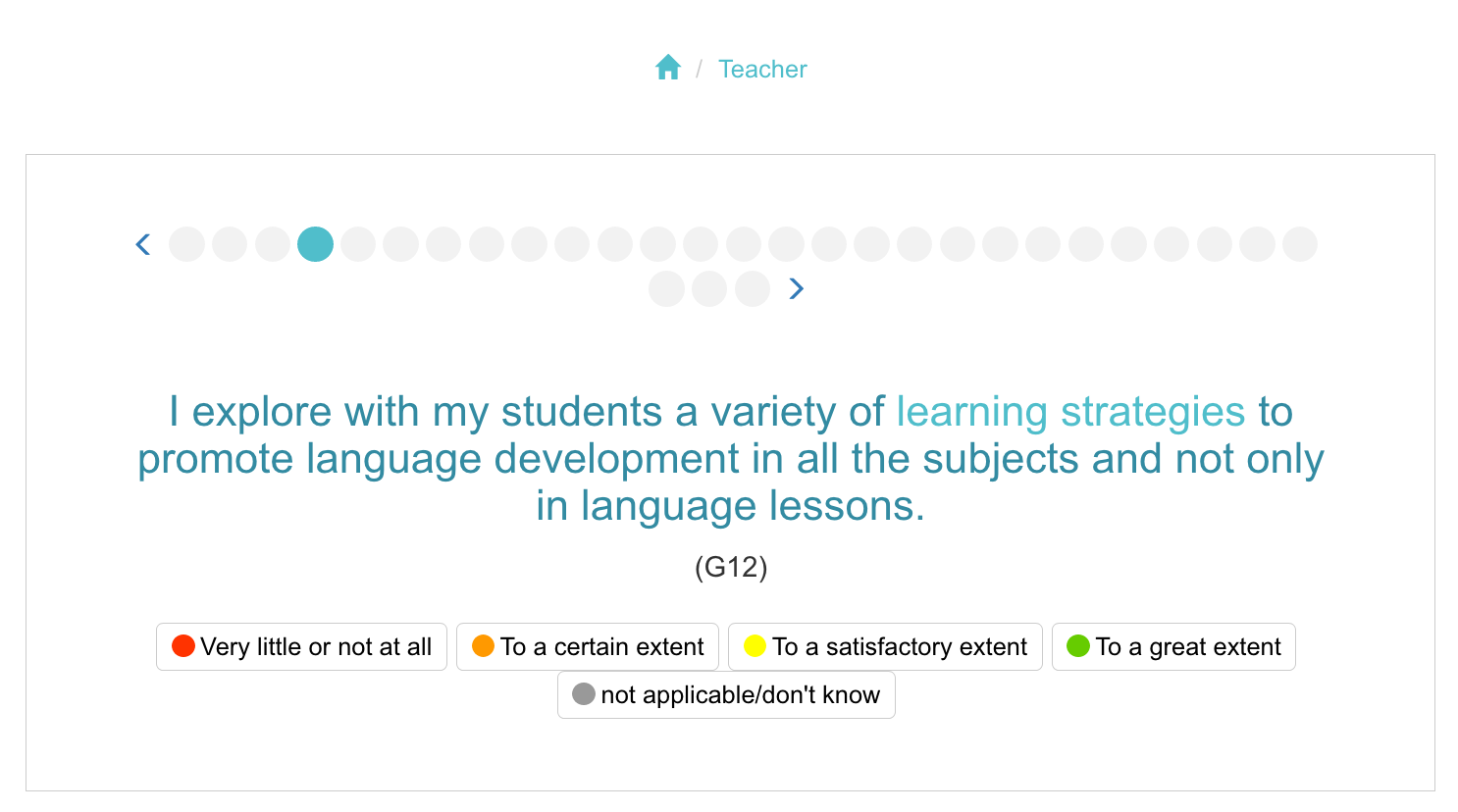
Capture d’écran 2 : Réponse simulée à l’une des questions posées à un enseignant
Une fois l’enquête terminée, il est possible d’imprimer les résultats montrant ses propres réponses personnelles, ce qui permet d’avoir une vue d’ensemble des idées relatives aux domaines thématiques identifiés ci-dessous (simulation des résultats).
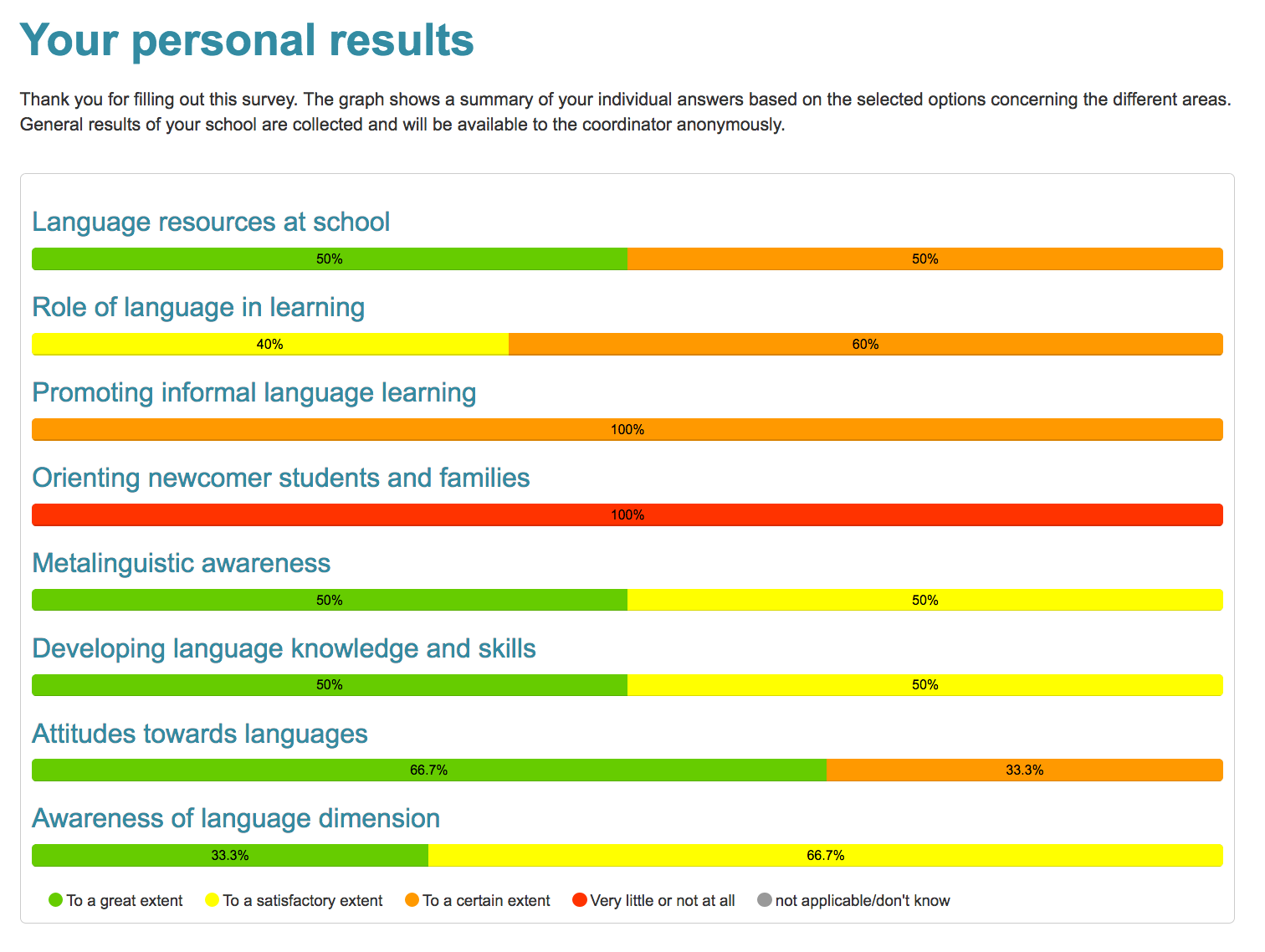
Capture d’écran 3 : Simulation des résultats personnels d’un enseignant
Les établissements reçoivent ensuite un rapport basé sur les réponses des différents acteurs, soulignant les forces et les leviers de progrès pour l’ensemble de l’établissement. Les résultats de tous les acteurs sont positionnés sur chaque axe représentant un domaine thématique, permettant ainsi de visualiser rapidement les forces et les leviers de progrès de l’ensemble de l’établissement (voir capture d’écran 4 ci-dessous).
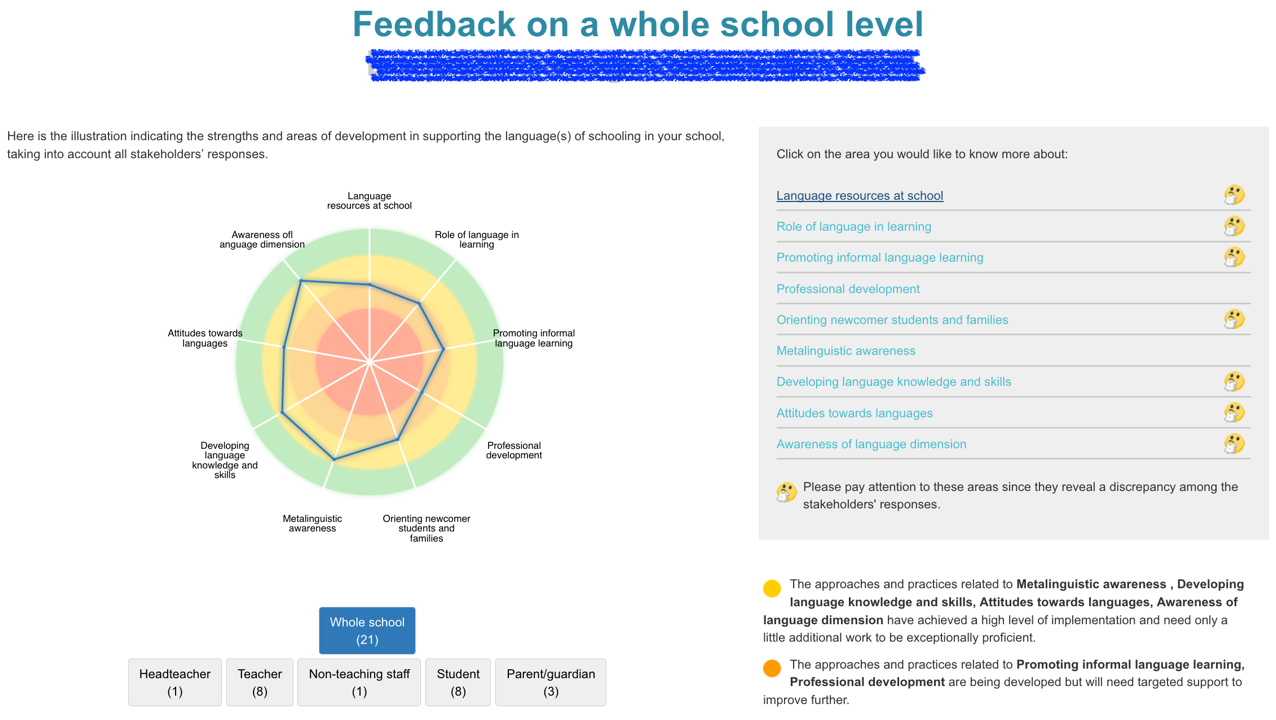
Capture d’écran 4 : Rétroaction au niveau de tout l’établissement
L’attention de l’établissement est attirée sur le(s) domaine(s) thématique(s) pour lequel(s) il existe un écart important entre les réponses des différents acteurs : même si le résultat global peut être positif, le fait que certains acteurs ne soient pas d’accord avec le reste des répondants mérite d’être discuté et utilisé comme point de départ pour le développement ultérieur de ces domaines.
Chaque domaine thématique peut également être analysé en profondeur afin de comprendre les positions des différents acteurs pris dans leur ensemble, l’anonymat des répondants au questionnaire étant absolument garanti (voir Capture d’écran 5 ci-dessous, qui est un retour détaillé lié au domaine thématique « Ressources linguistiques à l’école »).
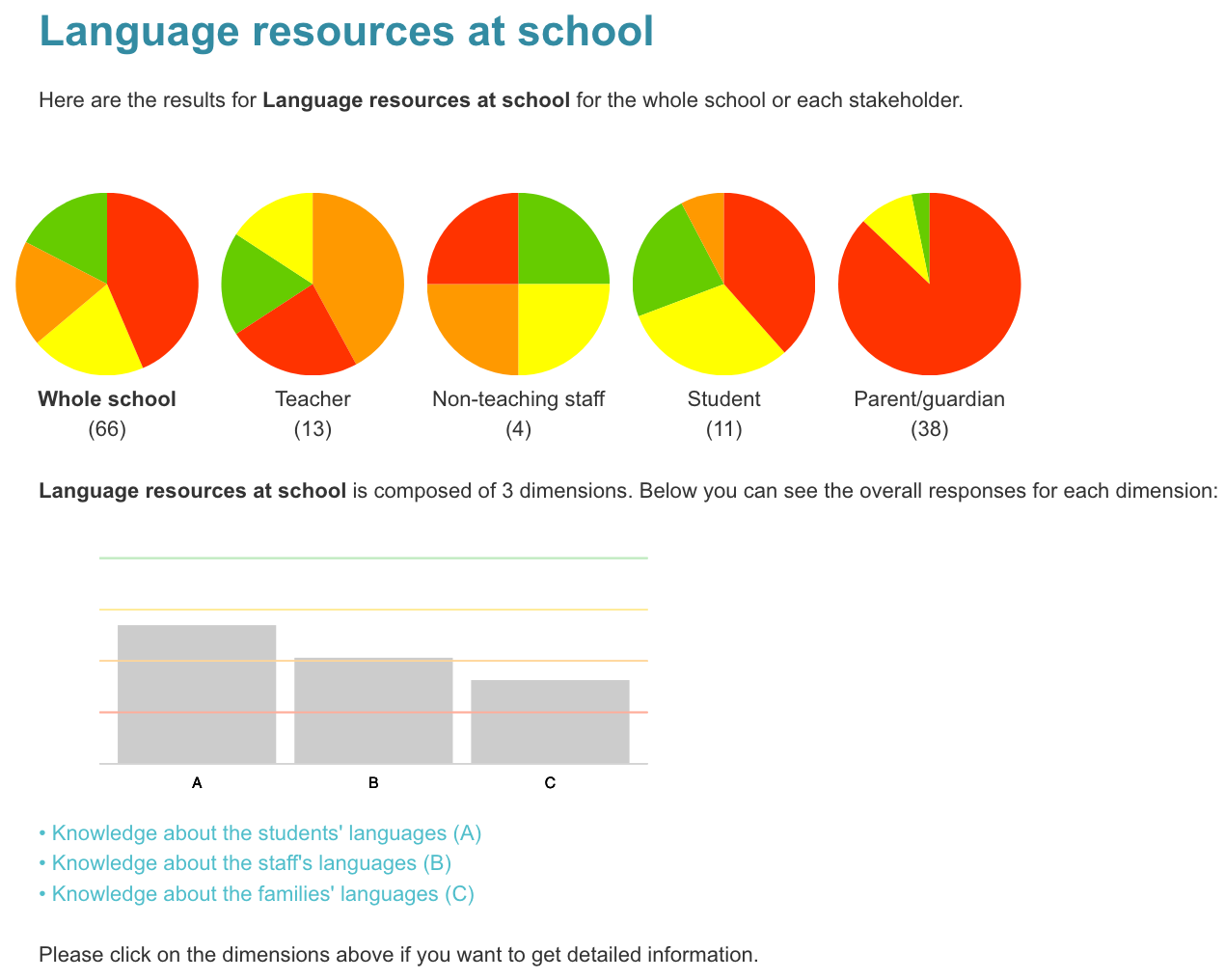
Capture d’écran 5 : Retour d’information détaillé sur le domaine thématique « Ressources linguistiques à l’école »
Enfin, des pratiques prometteuses envisagées comme sources d’inspiration seront proposées pour favoriser le dialogue entre tous les acteurs, ce qui devrait faciliter la mise en œuvre d’actions qui répondent aux attentes de chacun.
Perspectives d’avenir
L’atelier tenu à Graz les 15 et 16 novembre 2018 a permis d’apporter d’autres modifications à l’outil, afin d’en améliorer la convivialité, modifications qui seront prises en compte dans la nouvelle version en développement. Les experts ont également produit un certain nombre de « pratiques prometteuses » qui seront incluses dans la base de données qui sera une réelle source d’inspiration. En effet, la dernière étape sur laquelle nous nous concentrerons tout au long de 2019 est le développement de cette base de données qui permettra d’identifier un grand nombre de pratiques prometteuses non seulement à partir des projets actuels et précédents du CELV, mais aussi en mettant en évidence un certain nombre d’initiatives locales ou de projets nationaux et internationaux.
Références
Beacco, J.-C., Fleming, M., Goullier, F., Thürmann, E., & Vollmer, H. (2016). Les dimensions linguistiques de toutes les matières scolaires : guide pour l’élaboration des curriculums et pour la formation des enseignants. Strasbourg : Conseil de l’Europe. http://rm.coe.int/guide-pour-l-elaboration-des-curriculums-et-pour-la-formation-des-ense/16806ae61c
Conseil de l’Europe (2014). Recommandation CM/Rec(2014)5 du Comité des Ministres aux Etats membres sur l’importance des compétences linguistiques pour l’équité et la qualité de l’éducation et la réussite scolaire (adoptée par le Comité des Ministres le 2 avril 2014 à la 1196e réunion des Délégués des Ministres). https://search.coe.int/cm/Pages/result_details.aspx?ObjectID=0900000016805c6105
Fleming, M. (2009). Langues de scolarisation et droit à une éducation plurilingue et interculturelle. Rapport de la conférence internationale. Strasbourg : Conseil de l'Europe. https://rm.coe.int/rapport-de-la-conference-intergouvernementale-langues-de-scolarisation/16805a234f
Himmele, P., & Himmele, W. (2009). The language-rich classroom: A research-based framework for teaching English language learners. ASCD.
Vollmer, H. J. (2006). Langues d'enseignement des disciplines scolaires. Etude préliminaire. Langues de scolarisation. Strasbourg : Conseil de l'Europe. http://rm.coe.int/CoERMPublicCommonSearchServices/DisplayDCTMContent?documentId=09000016805c7466
06.03.2019
"La/les langue(s) de scolarisation : une feuille de route pour les établissements scolaires" : outil d’auto-positionnement pour les établissements scolaires et pratiques prometteuses disponibles en 2019
La réunion d'experts qui s'est tenue les 29 et 30 janvier 2019 a permis à l'équipe de discuter des dernières modifications à apporter à la feuille de route, un outil d’auto-positionnement pour les établissements scolaires. En effet, un certain nombre de questions ont été soulevées lors de la phase de test de la Feuille de route, mais le CELV s'engage pleinement à veiller à ce qu'elle fonctionne parfaitement bien dès que possible.
Notre objectif principal est maintenant de préparer un « dossier » qui permettra au coordinateur d'appréhender facilement la feuille de route, de la présenter aux membres de l’établissement (avec des présentations PowerPoint prêtes à l'emploi, des documents Word adressés aux parents, des modèles Word et des logos) et d’en exploiter les résultats, le mieux possible. Nous sommes en train de concevoir un document imprimable qui devrait aider le coordinateur à utiliser et à expliquer les résultats de l'établissement.
Nous recueillons également les pratiques prometteuses des projets précédents et en cours afin de compléter la base de données. L'idée est d'assigner une dizaine de pratiques prometteuses (si possible) à chacun des domaines abordant la/les langue(s) de scolarisation. Cela devrait nous permettre de proposer des idées pratiques pour les divers leviers de progrès proposés dans le rapport final de l'établissement. La base de données pourra également fonctionner comme un produit autonome, de sorte que les utilisateurs pourront simplement consulter les pratiques prometteuses liées aux langues de scolarisation sans avoir à répondre à l'enquête d'auto-évaluation de la Feuille de route.
L’équipe de projet : Rebecca Dahm (France, coordinatrice), Katri Kuukka (Finlande),
Selin Öndül Talegon (Suisse), Nermina Wikström (Suède)
15.11.2018
« La/les langue(s) de scolarisation : une feuille de route pour les établissements scolaires » : l’atelier du projet vient d'être lancé
L'atelier du projet « La/les langue(s) de scolarisation : une feuille de route pour les établissements scolaires » se tiendra au CELV les 15 et 16 novembre pour finaliser les résultats qui seront disponibles dans le courant de l'année 2019. Pendant ces deux journées, l'équipe de projet, le partenaire du projet et le consultant du projet collaboreront étroitement avec 36 experts venant de 29 pays.
Le programme visera principalement à :
- travailler sur la dimension linguistique des disciplines – en contextualisant les concepts théoriques par rapport à la réalité des participants et en s’appuyant sur une analyse de la feuille de route en fonction des différents acteurs ;
- recueillir et discuter des pratiques prometteuses dans les contextes des participants, et travailler sur la base de données rassemblant ces pratiques ;
- discuter du guide prévu pour le projet.
*****
Le présent projet (2016-2019) porte spécifiquement sur la ou les langues de scolarisation et s'adresse aux écoles (primaires ou secondaires) qui souhaitent aider tous leurs élèves à réussir. Au sein de ce groupe, l'équipe du projet accorde une attention particulière aux élèves qui dépendent de l'école pour développer la langue de scolarisation, c'est-à-dire la langue utilisée pour enseigner les différentes matières scolaires et pour le fonctionnement des écoles. Le manque d'accès à cette langue dans un contexte familial, quelles qu'en soient les raisons (un contexte socio-économique défavorable, des enfants nouvellement arrivés ou issus d'un environnement en langue des signes, etc.), ne permet pas à ces élèves d'accéder au savoir de la même manière que les autres. Par conséquent, il est nécessaire que tous ceux qui travaillent dans l'école soient conscients de la situation et trouvent des solutions.
Le projet propose une « feuille de route » qui est un outil numérique pour accompagner les écoles dans leur réflexion sur la ou les langues de scolarisation et dans la mise en œuvre d'une stratégie qu'elles ont elles-mêmes déterminée. Pour ce faire, un outil d'auto-évaluation permettra à chaque partie prenante (chef d'établissement, enseignants, personnel non enseignant, élèves et parents) de commencer à réfléchir sur la situation dans leur école, en évaluant différents domaines thématiques.
*****
Expressions clés
Langue(s) de scolarisation
Langue(s) utilisée(s) dans l'enseignement des disciplines. C'est la langue dominante de l'enseignement scolaire qui est normalement la principale langue nationale ou régionale.
D'après Beacco, J.-C., Fleming, M., Goullier, F., Thürmann, E., & Vollmer, H. (2016). Guide pour l'élaboration des curriculums et pour la formation des enseignants. Les dimensions linguistiques de toutes les matières scolaires. Strasbourg : Conseil de l'Europe.
Dimension linguistique des disciplines
La langue est autant un outil de conceptualisation des contenus et des connaissances qu'un outil d'expression dans un style rationnel et « académique », fondé sur des conventions et des registres propres à la discipline.
D'après Vollmer, H. J. (2006). Language across the curriculum. Strasbourg : Conseil de l'Europe.

13.06.2018
Vient de paraître : Courriel européen des langues n° 40, le magazine du point de contact du CELV en France
Le Courriel européen des langues, magazine édité deux fois par an par le Centre international d’études pédagogiques (CIEP), fait peau neuve dans son numéro 40 avec une maquette plus moderne et un contenu renouvelé.
L’édition met en valeur six activités en cours du CELV, en laissant la parole aux coordonnateurs et à un membre d’équipe des projets, ainsi qu’à des enseignants sur le terrain. Par ailleurs, le Point de contact du Danemark met en exergue la nouvelle stratégie nationale des langues dans cet Etat membre. Pour finir, une rubrique présente 11 ressources récentes (matériels en ligne, publications).
Le Courriel est diffusé en français sur le site web du CIEP et sur son portail LISEO (voir rubrique Courriel européen des langues). Vous pouvez vous abonner gratuitement au Magazine et retrouver les archives sur le site http://www.ciep.fr/lettres-information/courriel-europeen-langues.
Au sommaire du numéro 40 (mai 2018) :
Focus sur le projet EOL
- EOL – Des environnements d’apprentissage optimisés pour et par les langues
Article de Jonas ERIN, Inspecteur général de l’éducation nationale, coordinateur européen du projet EOL
- Témoignages
- Le projet EOL au collège André Chénier (Carcassonne)
Témoignage d’Émilie Courtejaire, avec la collaboration de Selvi Gras, professeur d’anglais et professeur d’espagnol au collège André Chénier, coordinatrice du projet EOL pour le collège
- Le projet EOL au lycée Les 7 Mares (Maurepas)
Témoignage de Noëlle Sédilot-Gasmi, Professeure d’espagnole et coordinatrice de la discipline, initiatrice et coordinatrice du projet EOL pour le lycée
Autres projets du CELV
- Le projet e-lang - Vers une littératie numérique pour l’enseignement et l’apprentissage des langues
Article de Christian Ollivier, Professeur des universités à l’université de La Réunion, coordinateur du projet e-lang
- La/les langue(s) de scolarisation : une feuille de route pour les établissements scolaires
Article de Rebecca DAHM, Maître de conférences en didactique des langues, ESPE Midi-Pyrénées – Université Toulouse-Jean Jaurès, coordinatrice du projet Langue(s) de scolarisation
- Le projet QualiMatrix dans sa dernière année de développement
Article de Gudrun ERICKSON, University of Gothenburg, Department of Education and Special Education, documentaliste du projet QualiMatrix
Actualités
- Développer la conscience linguistique dans les matières scolaires : appel à contribution pour les enseignants de DNL
- Vers un Cadre européen commun de référence pour les enseignants de langues : trois instruments à l’honneur en 2018
- La Gazette européenne des langues
L’enseignement des langues au Danemark
- Entretien avec Ana Kanareva-Dimitrovska, point de contact national du Danemark
Propos recueillis par Marion Latour et Bernadette Plumelle
Ressources
- À explorer sur internet
- Label européen des langues : EUROBAC
- Écrire en plusieurs langues : dossier réactualisé « Intégrer le numérique en classes de langues »
- Dossier thématique « La mémorisation : Dans quelle mesure le numérique permet-il de créer des situations d’apprentissage efficace ? »
- Audio Lingua : 5 000 fichiers audio en 13 langues
- Radio Garden : écouter en direct toutes les radios nationales, locales ou web du monde
- 7 nouveaux kits eTwinning pour monter un projet eTwinning
- Vient de paraître
11.09.2017
Lancement du projet « La/les langue(s) de scolarisation : une feuille de route pour les établissements scolaires »
Il est souvent difficile de traduire mot à mot les projets du CELV ; nous choisissons donc de préciser les idées-clés dans chacun des documents proposés dans les trois langues du projet, plutôt que d’effectuer une traduction verbatim. Nous souhaitons tout d’abord souligner, dans le cadre de notre projet, que le concept « Roadmap » clairement défini et régulièrement usité en anglais, se traduit en français par « feuille de route », terme plus flou et bien moins efficace. Il ne s’agit pas de vous proposer une voie royale, ni même une cartographie précise et unique ; une telle idée relève de l’utopie, puisqu’il y a autant de situations linguistiques spécifiques qu’il y a d’établissements. De la même façon, porter son attention sur les langue(s) de scolarisation renvoie bien souvent à la situation des élèves allophones alors que ce projet s’adresse à TOUS les élèves qui, du fait du décalage de leurs compétences langagières par rapport aux exigences de l’école, éprouvent des difficultés scolaires. Par langue(s) de scolarisation, nous entendons la/les langue(s) d'enseignement (qui sont le plus souvent les langues nationales ou officielles) et qui, en tant que telle(s), constitue(nt) une dimension transversale à toutes les disciplines. Dans de nombreux contextes, il s’agit de la deuxième langue des élèves. Ce projet propose, par conséquent, une « feuille de route » qui a pour but d’aider les établissements scolaires - de l’école maternelle (CITE[1] 0) à l’école de second degré (CITE 3) - à mettre en place leur propre stratégie concernant la/les langue(s) de scolarisation, stratégie à inclure dans le projet d’établissement. Il s’agit non pas d’un plan préétabli, mais davantage d’un accompagnement à la mise en place d’un plan stratégique linguistique au sein de l’établissement, stratégie qui doit être adaptée aux besoins locaux, en fonction de l’environnement et de la population. Cette stratégie permettra, en outre, d’améliorer la maîtrise de la/des langue(s) de scolarisation de TOUS les élèves, et par le développement de leurs compétences linguistiques, faciliter leur accès à la connaissance et à la réflexion critique de manière à leur assurer une meilleure réussite scolaire.
La « Feuille de route pour les établissements scolaires » prend appui sur un outil d'auto-positionnement ergonomique permettant à l’établissement de prendre conscience de ses points forts et des domaines restant à développer en matière de dimension linguistique, et ce quelle que soit la matière et/ou situation scolaire. Les établissements pourront ainsi mieux appréhender le rôle joué par la langue dans l’acquisition et l’utilisation des connaissances dans toutes les disciplines et dans toutes les situations scolaires, en les mettant au regard des instructions officielles (ou les objectifs scolaires nationaux/régionaux, le cas échéant). Il s’agit d’aider tous les acteurs de l'école à augmenter leur conscience du rôle joué par la dimension linguistique dans chaque discipline et dans toutes les situations d’interaction, de manière à pouvoir mettre en place une culture d’établissement sensible à la/aux langue(s) de scolarisation.
La Feuille de route propose une approche globale, concertée, qui met l'accent à la fois sur le rôle joué par le chef d’établissement, par les personnels enseignants, mais aussi par le personnel non enseignant dans l'élaboration et la mise en œuvre d'une stratégie pour les langues de scolarisation. Elle prend également appui sur les communautés, les familles et implique activement les élèves afin de réunir toutes les synergies positives au service de la réussite de ces derniers.
Le projet offre des exemples d'interventions en classe, de collaboration entre les enseignants et des idées pour impliquer le personnel non enseignant, les élèves, les parents et la communauté dans son ensemble. La Feuille de route pour les établissements scolaires vise à soutenir les langues de scolarisation en prenant appui les autres projets du CELV tels que, entre autres, le développement de la conscience linguistique dans les matières scolaires (projet Languages in Subjects) et la mise en place d’environnements d’apprentissage optimisés pour et par les langues vivantes (projet EOL).
L'équipe du projet a tenu sa première visioconférence fin décembre 2016. La première réunion en présentiel a eu lieu à Graz à la fin du mois de mars 2017. Au cours de ces deux journées, l'équipe a discuté des objectifs et des acteurs impliqués dans la Feuille de route, a approfondi la compréhension mutuelle des concepts-clés, a planifié le calendrier 2017-2018 et a commencé à identifier les domaines à évaluer. Nous espérons pouvoir compléter l'ensemble des critères permettant d’établir l'outil d'auto-positionnement avec l'aide des partenaires associés, d'ici fin septembre 2017, avant la première réunion de réseau qui se tiendra les 22 et 23 novembre 2017. Cette réunion rassemblera les experts et acteurs du domaine afin de discuter des critères proposés de manière à pouvoir finaliser un outil correspondant à leurs besoins ; les établissements scolaires devraient ainsi être en mesure de développer les compétences linguistiques et donc de réflexion critique de tous les apprenants, compétences nécessaires pour réussir à l’école aujourd’hui et remplir leur rôle de citoyen à l’avenir.
Site web du projet: français - anglais - allemand
Equipe du projet
Rebecca Dahm
Coordinateur
ESPE de l´académie de Limoges - Site de Tulle
rebecca.dahm

univ-tlse2.fr
Katri Kuukka
Chargée de communication de projet
Finnish National Agency for Education
katri.kuukka

oph.fi
Selin Öndül Talegon
Suisse
Selin Öndül Talegon
Documentaliste pour la deuxième langue de travail
City of Zurich, Department of Education and Sport
selin.oendueltalegon

zuerich.ch
25.04.2018
« La/les langue(s) de scolarisation : une feuille de route pour les établissements scolaires » : réunion d'experts (15-16 mars 2018)
La réunion de deux jours a été une occasion remarquable pour les experts de progresser et de finaliser les bases pour l'outil d'auto-évaluation, élément essentiel de la Feuille de route.
Pendant les deux jours de travail intensif, l'équipe a examiné de manière critique les phrases rédigées pour chaque acteur (personnels de direction, enseignants, personnel non enseignant, élèves et parents), en tenant compte des commentaires des 536 participants de la phase pilote 1. Ces phrases ont été harmonisées afin d'établir 32 énoncés (soulignant les idées principales), puis adaptées de nouveau en phrases pour chaque acteur, le cas échéant.
L'équipe a discuté du contenu et de la manière dont le retour d'information de l'outil d'auto-évaluation devrait être présenté, avec le soutien de l’administrateur du site web du CELV, Christian Friedrich. Les déclarations ont été vérifiées une fois de plus, et neuf faisceaux (regroupant plusieurs déclarations) ont été déterminés.
Le projet progresse donc très bien, et l'équipe est satisfaite de voir que l'outil d'auto-évaluation prend forme et apparaîtra comme un outil convivial et complet à l'usage des établissements scolaires. Il devrait apporter un soutien considérable aux établissements scolaires souhaitant mettre en place un plan stratégique sur mesure, après discussions et décisions convenues par tous les acteurs, et promouvoir ainsi l'amélioration de la qualité dans des domaines tels que la prise en compte de la dimension linguistique dans les disciplines, le développement d'une culture scolaire sensible aux langues, la stratégie linguistique à mettre en place et le cadre organisationnel que cela implique.
L’équipe de projet : Rebecca Dahm (France, coordinatrice), Katri Kuukka (Finlande),
Selin Öndül Talegon (Suisse), Nermina Wikström (Suède)
12.02.2018
Echange intense et fructueux sur les développements futurs dans l'éducation aux langues
Les 6 et 7 février derniers, les coordonnateurs des projets en cours du CELV se sont réunis dans les locaux du Centre à Graz, en Autriche. La rencontre a été une excellente occasion de débattre des développements en cours dans ce cercle.
Les participants ont notamment exploré les possibilités de synergies et échangé des bonnes pratiques en matière de méthodologie de projet. Ils ont discuté de l'état d'avancement des travaux liés à l'élaboration de leurs produits et réfléchi à la meilleure manière de diffuser le large éventail des résultats finaux qui seront atteints d'ici la fin de 2018 et 2019. L'identification de facteurs critiques de succès a également fait l'objet d'une réflexion approfondie, en vue de promouvoir les réalisations tout au long et à la fin du cycle de vie de chaque projet, d'assurer leur mise en œuvre et leur médiation, de les développer davantage le cas échéant et de maximiser leur impact dans les différents contextes à la fois nationaux et individuels. Enfin, les experts ont partagé leurs premières idées sur la structure et les contenus potentiels qui pourraient être pris en compte pour le prochain programme du CELV (2020-2023). Pour finir, ils ont souligné la valeur ajoutée, tant professionnelle que personnelle, qu'apporte la coordination d'un projet du CELV, considérant qu'il s'agit là d'une opportunité de rapprocher les politiques, la recherche et la pratique et de contribuer, de façon appréciable, à améliorer la qualité de l'éducation aux langues en Europe.
Impressions en image de la rencontre (les photos sont disponibles sur Facebook)
Programme d'activités actuel du CELV 2016-2019 : «Les langues au cœur de l'apprentissage»
16.01.2018
La/les langue(s) de scolarisation : une feuille de route pour les établissements scolaires - Capitaliser sur le passé... pour construire l’avenir
Le meilleur moyen d’aider les enfants à améliorer leur connaissance des langues de scolarisation est d’élaborer une stratégie linguistique globale. C’est le but du projet du CELV intitulé : « La/les langue(s) de scolarisation : une feuille de route pour les établissements scolaires ». Pour élaborer une telle stratégie, il est essentiel d’identifier les défis linguistiques propres à l’établissement et d’impliquer toutes les acteurs afin de s’entendre sur des solutions adaptées. C’est pourquoi nous avons consacré l’année 2017 à la création d’un outil d’auto-évaluation, adapté aux différents besoins de la communauté d’apprentissage. Notre objectif pour 2018 est de piloter cet outil afin d’identifier et de partager des exemples de pratiques qui semblent prometteuses dans le but d’inspirer les établissements à développer leur propre stratégie et à trouver des moyens pour la mettre en œuvre.
Le Centre européen pour les langues vivantes (CELV) attache une grande importance au développement des compétences dans les langues de scolarisation et son programme 2012-2015 « Apprendre par les langues » a abouti à la production d’une palette de ressources dans ce domaine. Notre objectif est également de les mettre en avant, à savoir : capitaliser sur le passé pour construire l’avenir. Nous vous invitons à explorer les ressources les plus pertinentes des différents projets dont vous trouverez les liens ci-dessous :
Pluriliteracies
PlurCur
Language Descriptors
MALEDIVE
EduCoMigrant
Parents
En outre, dans son programme actuel intitulé « Les langues au cœur des apprentissages », d’autres outils, liés aux langues de scolarisation, sont actuellement conçus. Au fur et à mesure que nous avancerons dans notre projet en 2018, nous prévoyons de créer un site Web qui guidera l’utilisateur vers ces outils ainsi que vers d’autres ressources connexes, en constituant une banque de matériel pédagogique facile d’accès.
Site du projet
09.01.2018
La/les langue(s) de scolarisation : une feuille de route pour les établissements scolaires - Réunion du réseau (22-23 novembre 2017)
La réunion du réseau du projet « La/les langue(s) de scolarisation : une feuille de route pour les établissements scolaires » s'est tenue les 22 et 23 novembre 2017 au siège du CELV à Graz. Après une introduction par Mme Sarah Breslin, directrice du CELV, et une présentation par les membres de l'équipe afin de permettre aux participants de saisir les enjeux du projet et le cadre théorique sous-jacent, les nombreux travaux de groupe et les discussions intenses et fréquentes ont permis d'atteindre les objectifs de la réunion.
Seize participants de douze pays différents ont examiné en profondeur les critères de la feuille de route, ont discuté de leur pertinence et les ont réorganisés selon les domaines thématiques suivants : Stratégie langagière de l'établissement, Cadre organisationnel, Pédagogie fondée sur la conscience linguistique et Culture scolaire sensible aux langues. L'équipe a ensuite permis aux participants d'analyser voire de reformuler les phrases de l'outil d'auto-positionnement en prenant en compte le point de vue des différents acteurs : chefs d'établissement, enseignants, élèves, personnel non enseignant et parents. Même si la communauté au sens large est un acteur important, les participants ont jugé peu pratique de leur soumettre l'outil d'auto-évaluation ; par conséquent, des questions seront posées aux autres acteurs de manière à tout de même les prendre en compte de manière indirecte. Les participants ont fourni des contributions de très grande qualité et ont été exceptionnellement efficaces puisqu'ils ont proposé un ensemble de phrases revues et adaptées à l'équipe.
L’équipe reprendra les phrases en les rédigeant de manière claire, objective et accessible afin de finaliser un outil d'auto-positionnement facile à utiliser. Des outils de collaboration en ligne ont été mis en place afin de faciliter une participation continuée des experts du réseau, à leur demande. Une première phase test des déclarations se déroulera du 20 décembre 2017 au 8 mars 2018 afin de disposer d'un outil d'auto-positionnement pleinement opérationnel avant la prochaine réunion d'experts.
Ce fut un immense honneur et un véritable plaisir de pouvoir mettre en place les fondements de la Feuille de route avec un groupe de participants professionnels aussi impliqués et efficaces.
Site du projet